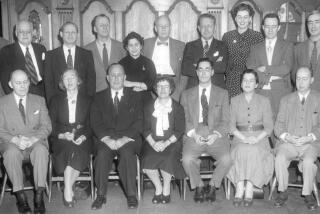Bad Spying or Political Heat?
- Share via
Before the war, intelligence reports warned that Saddam Hussein was hiding a trove of chemical and biological weapons, and that if we invaded, the brutal dictator would use them on us instantly. In fact, it was the alleged presence of these terrifying chemical and biological agents that was the casus belli for bringing down Hussein’s regime.
But now, despite teams of inspectors scouring the country, those weapons are nowhere to be found, and questions have risen over whether they ever even existed.
What went wrong? Did our operatives collect bad information? Did our analysts misread the tea leaves? Or, worse yet, did policy wonks silence or slant the views of the intelligence community to suit their own agenda? Could there even have been a deliberate fabrication designed to bring us into the war?
These questions hang heavy over the governments of Tony Blair and George W. Bush and threaten to tarnish the dramatic, swift victory in Iraq. The CIA has begun an internal review to determine whether the agency miscalculated the risks, and both the House and Senate will conduct investigations of prewar intelligence.
As veterans of previous policy battles, we have firsthand experience with the dynamics that politicize intelligence. It is an old phenomenon, an inevitable consequence of the clash between political operatives and intelligence professionals.
For example, President Johnson and his national security team pressured CIA analysts to “be team players” on the issue of Vietnam. They were “encouraged” to alter their analysis to support the administration position that North Vietnam was losing the war. Some, such as Sam Adams and George Allen, resisted.
In 1988, intelligence reports from case officers in the field were altered to suggest that Honduran leftists were willing to attack U.S. troops.
During Bill Casey’s tenure as the director of the CIA, one of the South African analysts was asked to determine whether Nelson Mandela was a communist. The analyst began his article stating something to the effect that “although Mandela had several communist associates, he was not a communist.” A senior CIA manager, eager to curry favor with the White House, edited the piece by eliminating the words “although” and “not.” Fortunately, the analyst challenged the change and prevailed.
How intense was the pressure on intelligence-gatherers in the months leading up to the war against Iraq? Friends and former colleagues in the intelligence community say it was quite intense, and they describe a concerted effort to politicize the process. Some even say it led to deliberate fabrication.
We already know there was a fabricated intelligence report that said Iraq was trying to procure nuclear material from Niger. And the Pentagon is known to have put pressure on the CIA to dig up more critical information on Hussein, and even went so far as to set up its own intelligence division because it didn’t feel the CIA was doing enough.
Bush’s doctrine of preemption is a bold and potentially beneficial policy. But to work, preemption must depend on accurate intelligence. If the intelligence about Iraq’s weapons was simply inaccurate, then it was not just a failure by human sources to tell us the truth. It also implies that our technical methods -- including overhead photographs and intercepted conversations -- were wrong.
If, on the other hand, it was a case of politicized intelligence, then the situation is equally serious. Intelligence analysts have a professional and ethical obligation to provide accurate information to their bosses. That responsibility cannot be overemphasized.
The absence of chemical and biological weapons in Iraq raises troubling questions. If a new crisis arises in Iran or North Korea and Bush or Blair alerts the world to the new danger, will he be believed? We cannot afford to have doubts.
More to Read
Sign up for Essential California
The most important California stories and recommendations in your inbox every morning.
You may occasionally receive promotional content from the Los Angeles Times.










